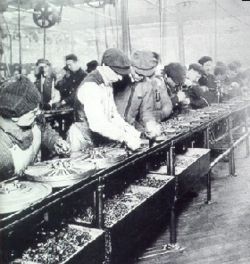Workers Defense Project: Occult Expertism
I think this, albeit anecdotal, encounter says something about the nature of the way that the Workers Defense Project handles its business. First, there is a large separation between the on-the-ground operations of the group and the directers of the organization. There exists a significant gap, both perceptually and empirically, between those the organization's leadership and its body of workers. While it is practically impossible, and perhaps unwise, to completely abolish this fissure between the visionaries and the implementers of social change; this structural fact potentiates some more significant consequences for the group's future.
 How will an organization whose stated aim is to work on behalf of workers be perceived if it models the corporate structure in all aspects except the profit motive? Do the inequalities of work relations end when incentive structures and monetary systems are equalized? Or do other power relations persist beyond the numbers on the spreadsheet? Although the Board of Directors is quite exceptionally qualified according to neoliberal standards; most of the executives have multiple higher education degrees, some even from Ivy League institutions such as Brown, could they still be guilty of perpetuating the unequal power relations they aim to subvert?
How will an organization whose stated aim is to work on behalf of workers be perceived if it models the corporate structure in all aspects except the profit motive? Do the inequalities of work relations end when incentive structures and monetary systems are equalized? Or do other power relations persist beyond the numbers on the spreadsheet? Although the Board of Directors is quite exceptionally qualified according to neoliberal standards; most of the executives have multiple higher education degrees, some even from Ivy League institutions such as Brown, could they still be guilty of perpetuating the unequal power relations they aim to subvert?If the organizations maintains in the division of labor between skilled and unskilled labor, between experts and docile laborers, between those capable of adapting to an immaterialized, flexible and adaptive work environment and those that are more suited for basic manual labor how can our cultural ethos change from its current preoccupation with conflating skills with life value? How can our current systems of economic production break out of its rigid regimentation of people that has existed sinces The Republic or Aristotle's Politics, dividing the polis into Philosopher Kings and Workers, full humans and those naturally disposed to slavery?
The cult of expertism through which the organization perpetuates an ideology of paternalism damages its ability to cultivate a new sensibility of labour relations. If the oppressors view themselves solely as the bearer of Enlightenment knowledge that rides into the slums on a white horse of liberation they will be perceived in terms which are negligibly different from that of the original exploiters. Only when liberation becomes a mutual and reciprocal process, rather than a one-way street can a truly emancipatory politics arise anew.
Labels: Communication Studies, cyber rhetoric, Cyberhetoric, Expertism, Labor, Social Activism, Social Change, Work, Workers Defense Project




0 Comments:
Post a Comment
Care to Share your thoughts on this post?
Subscribe to Post Comments [Atom]
<< Home